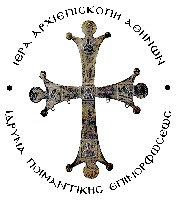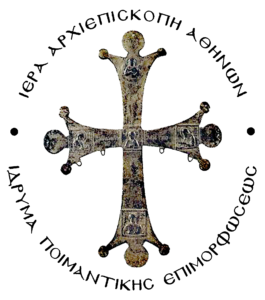The IPE has been seeking to improve and enhance the skills of those who assist in the work of social and welfare services and enable them to deal effectively with issues emanating from the consequences of modern economic, social, technological, intellectual, and spiritual developments, whilst ameliorating the management and administration of these services. To this purpose, the Institute designed and, since 04.11.2020, has started to implement a new Operation entitled “Lifelong learning Programmes for Members of Staff of the Church- Developing Open e-classes”, which forms part of the EU Operational Programme “Human Resources Development, Education and Lifelong Learning”.
The objective of this Operation is to carry out 140 training courses intended for the workforce (volunteers, staff, and associates) employed in social welfare services with particular emphasis on services manned by the Church (3,000 participants), covering 20 thematic units, which were devised by incorporating the findings of the Needs Assessment Survey, consisting of more than 4,700 assessment questionnaires identifying the pastoral and training needs of the clergymen and lay staff of the Church.
The following 20 new thematic units already being taught:
- Worship and Culture in modern life
- Contemporary Counselling
- Canon and Ecclesiastical Law: its ramifications for and application to the modern way of life
- The Ecumenical Synods and contemporary reality
- The aesthetic dimension of Holy Worship
- Pedagogical use of biblical texts
- Contemporary problems and cutting-edge issues considered form the standpoint of Patristic thought
- Parish organisation and administration: its contribution to man’s well-being
- Training new staff and volunteers in cutting-edge issues
- Organisational and development theory for Church missions.
- Athenian Saints. People and monuments from the ecclesiastical history of Athens and their message to modern society.
- Humanity and he environment in the perspective of a green world
- Vulnerable social groups and the Church
- Technology’s influence on and consequences for mankind in our times
- Aspects of the Greek Revolution of 1821
- A panoramic view of Islam: The World, Europe and Greece from the beginnings of Islam to the present day
- Holocausts and anti-semitism
- Training advanced-level cantors and traditional music practitioners
- Acquiring a deeper understanding of Byzantine and traditional music
- Greek and European musical culture with a concentration in Ecclesiastical music
The courses take place though synchronous and asynchronous in-person and distance learning classes and a system of synchronous and asynchronous distance and in-person instruction will become operational with the sole purpose of serving the needs of the Institute. The Platform will host materials relating to the entire range of thematic units and thus enable the use of training material in future training activities, bringing down costs significantly.
This project adds a further dimension to the present state of the lifelong- learning sector of the Church by offering Church staff the opportunity of receiving training free of charge in an area of their choosing from a wide-ranging list of topics and the option select the mode of learning that suits their wishes, access capacity and available time.
In particular, participants may undertake training in one of the following modes:
- In-person live training which is administered by the Holy Dioceses.
- Synchronous distance learning courses conducted through a platform.
Asynchronous distance learning courses conducted through a platform.To this date, 23 courses in 8 Holy Metropolitan Dioceses and various Departments and Services of the Greek State have been initiated combining in- person and synchronous learning. The Greek Government guidelines regarding the COVID-19 pandemic have been meticulously adhered to. More than 40 Holy Dioceses and other organisations have expressed an interest in carrying out one or more of the training courses on offer which remain free.




